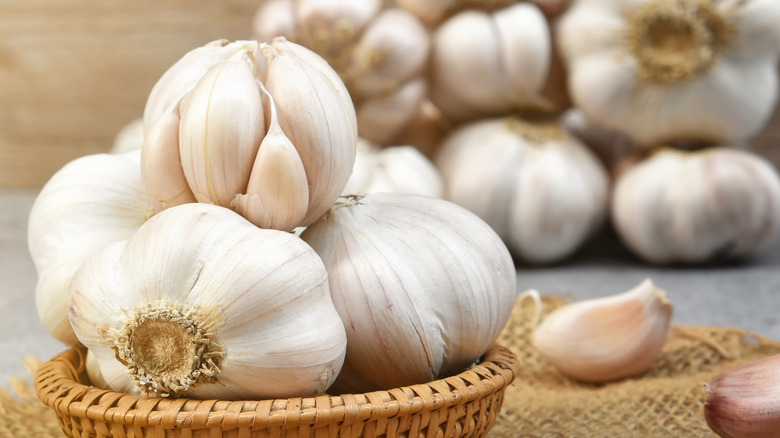Does Garlic Have Any Benefits If You Have Diabetes?
With 96 milliom U.S. adults being pre-diabetic, it may be time to rethink the Standard American Diet, which is notorious for being loaded with refined carbohydrates and simple sugars (via U.S. Centers for Disease Control and Prevention). Diabetes is a condition in which the body either doesn't produce enough insulin to effectively regulate blood glucose levels, or it doesn't do a good job of using the available insulin (via Healthline). As a result, blood sugar levels become too high.
This especially the case with type 2 diabetes, which is commonly triggered by diet and lifestyle factors. Reducing blood sugar levels can play a major role in managing the condition. The pancreas, which is responsible for producing insulin, can become overtaxed and unable to perform its important job. "It's called pancreatic burnout," Dr. Ian Smith, a former member of the President's Council on Fitness, Sports & Nutrition, told First for Women. "Continuously introducing a high sugar load to the system challenges the pancreas and can lead to cellular dysfunction ... When you get the sugar out, you let life in."
Garlic can help reduce blood sugar levels
Among the numerous tools available for diabetes management, there's a deceptively simple one that could offer significant benefits: including garlic as a regular part of the diet. Several studies have shown that garlic — either in its raw, cooked, or supplemental form — can help reduce blood sugar levels in those with type 2 diabetes. Not only that, but it may also help minimize the risk of complications associated with diabetes by promoting blood flow, reducing cholesterol and blood pressure, and fighting infections (via Diabetes.co.uk). As an added plus, garlic is perfectly safe for most people to consume in moderation.
Try including minced fresh garlic in homemade salad dressing or dip, or add it to sauteed veggies or mashed potatoes. If you don't care for the flavor, try taking a high-quality garlic supplement daily (after checking with your doctor). It's safe, affordable, and may provide a helpful addition to your diabetes management plan.


